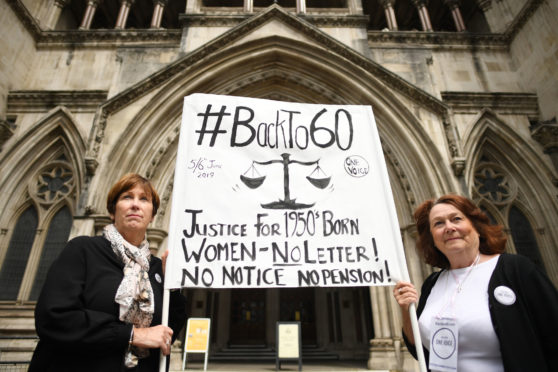Stealing handbags from grannies in their 60s is a shocking crime, but easy money for greedy opportunists.
Just ask our government.
Ministers and civil servants tore hard-earned pensions out of the hands of millions of women born in the 1950s just before they were due to receive them.
It was a smash-and-grab raid on a group least able to defend themselves.
A fortune was raked into government coffers while the victims were forced to work longer – and much sooner, more to the point – than promised under previous pensions amendments.
For many victims of what was to turn out to be government bungling on a grand scale it resulted in financial hardship and psychological problems.
Now Government lawyers have been dragged into the High Court at last to face the music.
Up to now, desperate women in their 60s who were abused by the government in this 2011 scandal have been fobbed off in the hope they would give up or die off eventually.
The women had already accepted that under a previous major pensions shake-up they would eventually be phased onto the same state pension age as men at 66, but over a 25-year transition period.
But in 2011, the government “accelerated” this process to allow 1950s-born women to work longer and “reinvigorate” their lives. In other words, a double-cross and abuse of trust to force many to work to 66 much sooner than anticipated and without adequate warning.
It was a botched-up, underhand shambles which was not only morally and politically unjust, but also legally suspect.
For example, it has been revealed that many victims were still being assured in government letters and on the official website that they were retiring at 60 – even after these latest changes had taken place.
Now they knew what it was to be a US bomber pilot in Joseph Heller’s classic novel Catch 22: the ones who were given a certain number of target missions to qualify to go home, but found the figure being increased so they never made it.
The government looked like dodgy paving contractors where the cracks were only spotted later after they had done a runner.
In all, almost four million women in the UK were caught in this cruel government trap with some worse than others. In Scotland, it is around 350,000.
Since then, ministers have been marooned in a sea of outrage and condemnation.
They cling to a flimsy lifeboat called “The Indefensible”, trying to argue their way out in vain.
It’s like the fairy tale of the emperor’s new clothes: everyone can see the truth of it except them.
Opposition parties led by the SNP, Labour and DUP are in unison behind the women’s campaign for justice.
MPs gave them a standing ovation when their campaign group Waspi (Women Against State Pension Inequality) disrupted prime-minister’s questions in the Commons.
Baroness Ros Altmann, a prominent campaigner on the issue, resigned as pensions minister in protest over the “catastrophic hardship” caused to women who had scrimped and saved all their lives by men enjoying tax-funded salaries of £150,000.
United Nations special investigator on global poverty Professor Philip Alston was most damning after a visit to our shores.
In a report he said the shock pensions change was “abrupt and poorly phased”.
Women born in the 1950s were “severely penalised…plunged back into the workforce when on the cusp of retirement…and with no time to adapt…”
When this affront to women’s rights was being perpetrated, you would have thought there must have been stirrings of outrage in the relevant government equalities department.
There was a minister for women’s rights and equality in 2011: it was none other than Theresa May.
There seems to have been a deafening silence from that direction – another social issue just burning away uncontrollably on Mrs May’s watch.
How does that square with her “one nation conservative” ideology, whose aim is to fight social injustice and close the gap between rich and poor, as laid out by founding father Benjamin Disraeli?
Civil service boss Sir Robert Devereux, who helped mastermind raising state pension age to 68 ultimately, was widely reported as retiring at 61 with a staggering pension pot of £1.8million.
You can’t make this up.
The stench of hypocrisy is everywhere. Just for the record, Mrs May is a member of the Waspi generation, but that is about all she will have in common. So is my wife, but like all the others she doesn’t want preferential treatment just fair treatment.
Current Work and Pensions Secretary Amber Rudd has led a rebirth of “one nation conservatism” within the parliamentary party to save it from annihilation.
But within weeks of starting her new post (after being forced to resign her previous one in a different scandal) she was pouring cold water on the Waspi women – telling them they were a pensions burden on young people. She dodged addressing the question of how they were tricked out of the retirement age they were entitled to in the first place by a treacherous government.
In 2011, someone got cold feet at the last minute over the enormity of what they were doing and begged David Cameron in Number 10 for more cash to soften the blow, but the “often callous” government was true to form and it went ahead anyway.
At the heart of “one nation conservatism” is a paternalistic and compassionate approach to protecting workers’ rights, for example.
For the Waspi women, its rebirth looks like a sham and not worth the paper it is written on – just like their pensions.
David Knight is the long-serving former deputy editor of the Press and Journal

